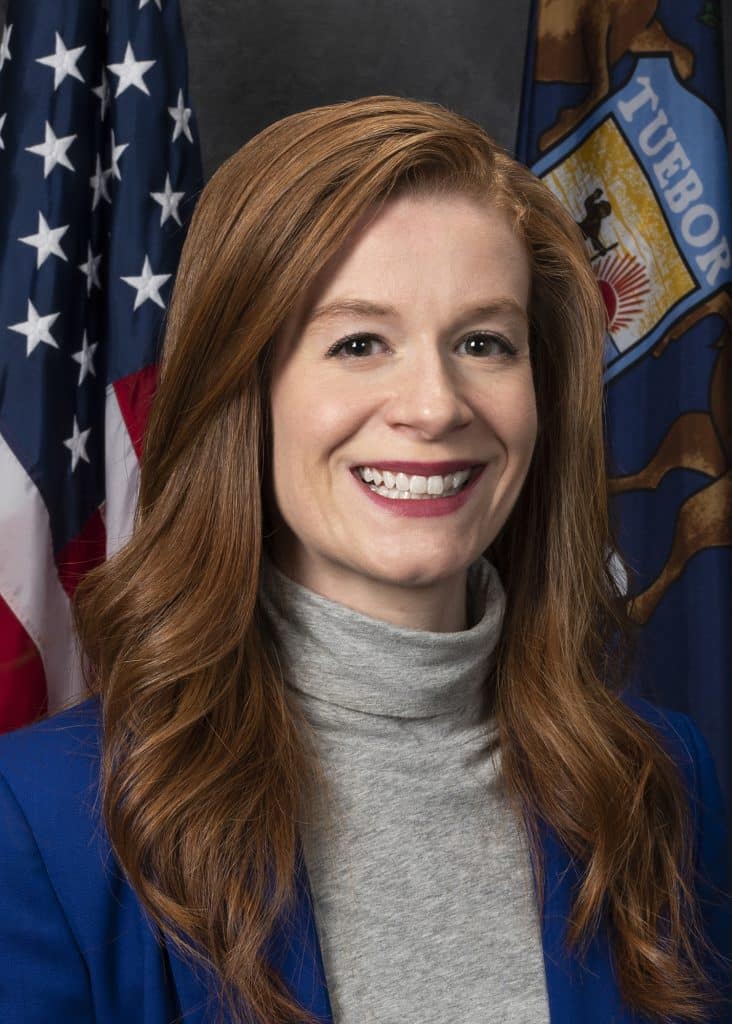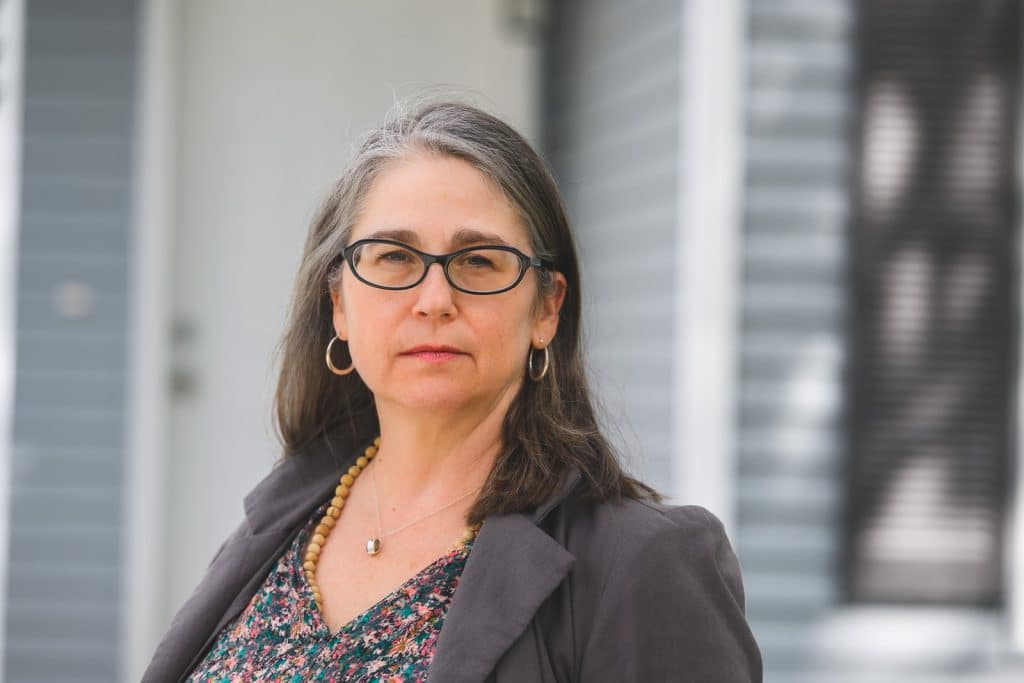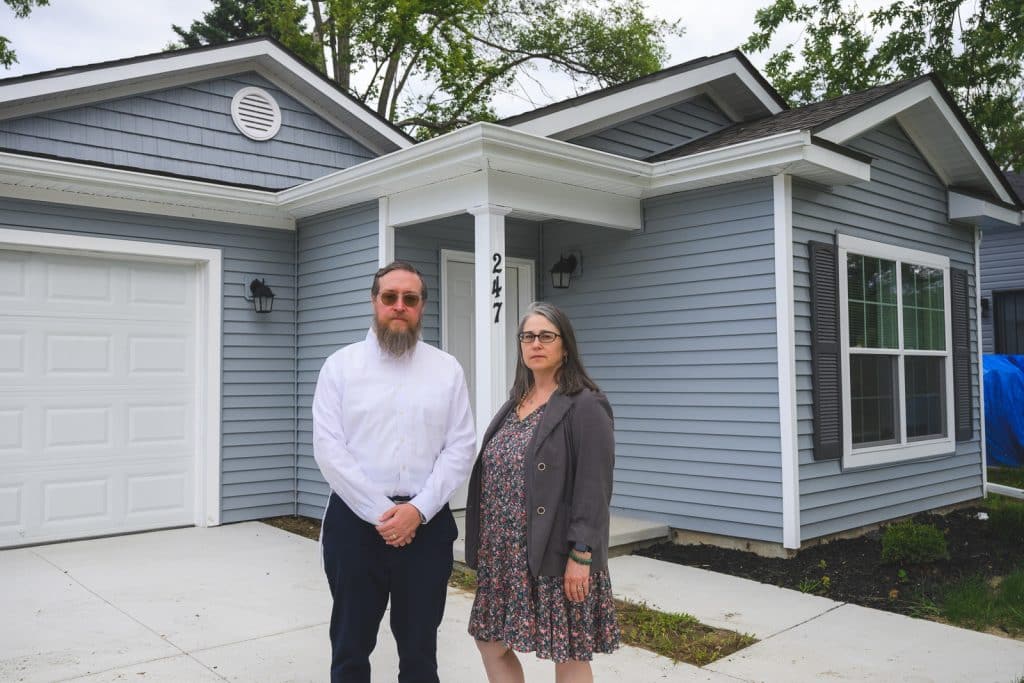This story is part of a series that highlights the challenges and solutions around housing in Southeast Michigan and is made possible through underwriting support from the Oakland County (Region L) Regional Housing Partnership.
As President Donald Trump’s second administration enacts its policy agenda, Ryan Hertz, president and CEO of Pontiac-based Lighthouse, says challenges are “coming from all directions” for Oakland County residents experiencing housing insecurity or homelessness.
Trump’s key policy bill, the One Big Beautiful Bill Act (OBBBA), passed in July. While it doesn’t cut major housing programs directly, Hertz and other housing service providers in Oakland County say its cuts to Medicaid and the Supplemental Nutrition Assistance Program (SNAP) are likely to have a major impact on housing-insecure families. Meanwhile, major cuts to the U.S. Department of Housing and Urban Development (HUD) have been pushed around the negotiating table as U.S. legislators draw up the federal budget for the 2026 fiscal year.
Hertz, who oversees Lighthouse’s mission to alleviate poverty in Oakland County, says the federal government’s austere approach “makes it so challenging” for service providers like himself to figure out how to help those who’ll be affected by the changes.
“I think the gap that we’re going to see is likely to far outpace what we’re likely to see, let’s say, coming from philanthropy to try to offset that, just because the resources aren’t there,” Hertz says. “… It does beg the question of how much ground we really want to lose. Somebody’s going to have to pick up the ball and try to fix these things at some point.”

Michigan Sen. Mallory McMorrow, who represents several eastern Oakland County communities, says she anticipates that federal policy will have a “cascading” negative impact on housing.
“I know that a lot of people are already squeezed out of housing,” she says. “… And with the uncertainty of programming at the federal level, it is only going to increase that incentive for developers not to renovate housing, not to create affordable housing, but to maximize their profits because of that uncertainty. So I really worry that we’re going to see the impacts sooner than we might anticipate.”
Hertz says response to those impacts is “going to fundamentally be left to local institutions,” including philanthropic institutions, corporations, and governments. Kirsten Elliott, CEO and president of the Troy-based Community Housing Network (CHN), agrees.
“As the nonprofit sector, we’ll work together,” she says. “We’ll work with the food banks, we’ll work with the faith-based communities, to fulfill those needs and hopefully fill that gap. But honestly, it’s going to be really, really tough.”
OBBBA: Medicaid and SNAP cuts vs. housing tax credit expansion
Housing service providers are bracing for the impact of the OBBBA’s estimated $911 billion cut to Medicaid and $186 billion cut to SNAP. Elliott says those cuts will “dramatically impact the stability of the folks that we are able to serve.” Eric Hufnagel, CEO of the Michigan Coalition Against Homelessness, outlines an anticipated domino effect.

“When [Medicaid and SNAP coverage are] lost, what is taken out of someone’s budget to offset that?” he says. “It puts more pressure if you lose some of that expendable income, and will no doubt have an impact on people’s ability to pay rent. It’s a modest amount, but all of those pieces are important because there are so many folks in this state who live paycheck to paycheck. … It’s hard to lose even a little bit of income and still be able to maintain housing, especially as housing prices are going up.”
OBBBA shifts the costs of SNAP from the federal government to the states, and it’s expected that many states will be hard-pressed to compensate for the federal cuts. Similarly, Hufnagel anticipates the state of Michigan will be unable to make up for OBBBA’s Medicaid cuts. Elliott says she expects that will lead to “an uptick of homelessness” in the next year among “precariously housed people” who had been able to get by with Medicaid and/or SNAP assistance.
The OBBBA does include what appears to be good news for affordable housing development. The bill authorizes a 12% increase in federal Low-Income Housing Tax Credits (LIHTC), the most common funding mechanism for affordable housing. That increase is specifically for the 9% LIHTC program, which offers developers a tax credit of roughly 9% of their project’s cost for 10 years. OBBBA also includes a provision to make it easier for developers to obtain LIHTC credits for 4% of project cost.
“If you’re looking for a bright spot in the [OBBBA], that would be it,” Hufnagel says. “But I can’t say that it’s shimmering so light that it overpowers all the darkness of the One Big Beautiful Bill Act.”

McMorrow agrees.
“It feels like trying to put a Band-Aid onto the devastating impacts of the rest of the bill,” she says. “… As we see the costs of building increase with labor, the supply chain, the tariffs, I just feel like this is good messaging for the Republicans that supported this bill, but it’s not going to do anything to actually help low-income housing.”
Elliott anticipates that the LIHTC expansion will be counterbalanced both by inflation’s effects on construction costs and by OBBBA’s extension of tax cuts from the 2017 Tax Cuts and Jobs Act. She says corporate tax cuts from Trump’s first term have already made LIHTC less valuable. Affordable housing developers like CHN typically receive LIHTC credits from the Michigan State Housing Development Authority, which receives them from the federal government. Developers usually sell the credits to investors to fund their affordable housing projects. Elliott says the value of the LIHTC credits she sells to finance CHN projects has already fallen steeply, from about $0.97 five years ago to $0.80 now. She recalls working on a LIHTC-funded affordable housing development deal that crumbled after Trump was elected in 2016. With corporate tax cuts on the way, an investor in that project lost interest in the cut they would have gotten from LIHTC.
Elliott anticipates further devaluation as a result of OBBBA.

“That difference … means less money or less equity to actually build the affordable housing,” she says.
Hertz says he “can’t even tell you how happy” he is that the Senate pushed for the LIHTC program expansion in OBBBA. But he adds that OBBBA “will ultimately, certainly in the short term, have a net negative impact on the lowest-income members of our communities.” Hufnagel agrees.
“Having [the LIHTC expansion] take place, while I think it’s going to be a good thing, is not going to be a magic moment,” he says. “It’s not going to be a fix for us immediately. We’re not going to see the results from that for years.”
Federal housing budget “losing ground” even if funding stays level
Local housing advocates and service providers are also keeping a close eye on the ongoing federal budget process for fiscal year 2026. Trump’s initial budget proposal outlined major changes to federal housing programs, including eliminating the HOME Investment Partnerships (HOME) and Community Development Block Grant (CDBG) programs, which both fund municipalities to build affordable housing and carry out other projects supporting low-income residents. Trump also proposed consolidating the Continuum of Care (CoC) and Housing Opportunities for Persons with AIDS programs into a single program, which Elliiott says would have resulted in the elimination of hundreds of permanent supportive housing units in Oakland County. Lastly, Trump proposed combining funding for several housing programs, including the Section 8 program, into block grants issued to the states, and cutting those programs’ funding by over $26 billion.
While those proposals alarmed many in the housing world, the U.S. House Appropriations Subcommittee on Transportation, Housing, and Urban Development nixed most of them in its HUD budget proposal, although it allocated no money for the HOME program. The House approved a $67.75 billion budget for HUD, about $937 million less than the previous year. That reduction would come primarily in the form of staffing cuts. The Senate was yet more lenient in its HUD spending bill, which would increase the department’s funding by $3.3 billion. The Senate bill would also maintain funding for the HOME program.
“I’m feeling much more hopeful now that I saw what came out of the House. And then, of course, looking at the Senate, that makes me feel even better about it,” Hufnagel says. “… But there’s always this uncertainty because you’re going to have a wide array of special interests trying to look out for themselves in this budget process.”
Hertz also expresses a tempered optimism about the budget process.
“We’re going towards the right direction from the worst versions of things that we were hearing,” he says. “That might have been the strategy all along, so we shouldn’t necessarily say, ‘Oh, great. We’re in great shape.’”

He says he thinks Trump’s initial proposal was intended to “desensitize” people “with the most horrific sticker shock that anybody could imagine … and then have us feel a little bit of a sense of relief when we’re actually still losing ground.” Hertz says many federal housing programs have already been losing money because their funding hasn’t kept pace with inflation, and that’s likely to continue even in the best-case scenario.
Housing program advocates continue to watch the budget process with bated breath. McMorrow says “uncertainty” is the greatest challenge federal policy presents for housing developers. As chair of the Michigan Senate’s Economic and Community Development Committee, she says she’s learned firsthand how complex it can be for developers to finance low-income, middle-income, or mixed-use housing developments.
“What just worries me is the builders that I talk to, the developers that I talk to who are focused on missing middle and low-income housing, say, ‘We just don’t know how to plan for this,’” she says. “And as a result, a lot of projects are being paused or canceled.”
Homeless removal in D.C. raises concerns in Detroit area
Local advocates for people experiencing homelessness are also keeping a wary eye on Trump’s recent deployment of the National Guard in Washington, D.C. In addition to cracking down on crime, the president has said the troops will clear homeless encampments.
“I don’t see this as problem-solving,” Hufnagel says. “I see that as problem-shifting. … ‘I want every homeless person out of Washington, D.C.’ is not a solution. It means you can’t see it, but that doesn’t mean that we’ve addressed the issue of homelessness. You’ve just moved it someplace else and you’ve probably made the situation worse at the same time.”
McMorrow agrees, describing the deployment as “security theater.” Trump has suggested he may take similar action in other major U.S. cities including Los Angeles, New York City, Baltimore, Chicago, and Oakland, Calif. While McMorrow says she takes some solace in the fact that the president hasn’t floated Detroit as a site for a possible troop deployment, she’s certainly not ruling out the possibility that he could.
“He’s done it in Los Angeles,” she says. “He’s done it in D.C. I think we should be on high alert for that to happen.”
Hufnagel says the president is “setting the table and kind of seeing how the public reacts to it to see whether or not it can go farther.”
“If you are emboldened to do it in one city, then it makes it much easier to be pursuing it in another city as well,” he says. “So, yes, it could certainly happen in Detroit. It could happen in Grand Rapids. You name it, it could happen.”

